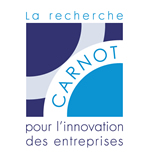R-CUE harnesses residual heat from a district heating network to a high-performance system for drying wood.
R-CUE is helping to meet increasing demand for firewood by reusing the unavoidable heat from its district heating network. The hot air driven through specially-adapted containers – designed in partnership with Carnot MICA Institute – dries the logs in just a few hours instead of in a couple of years !
Supporting Innovation
In 2013, R-CUE (a French acronym for Eastern district heating network) inaugurated a biomass cogeneration plant and heating network that serves the equivalent of 3500 dwellings in the town of Saint-Louis. The plant uses local wood chips and corn cobs to heat over 300 m3 of water flowing through the networks’ 12 km of pipes. Thanks to the energy recovered from the smoke using a condenser, a water circuit heated to nearly 50°C projects hot air into specially-designed containers, each containing 20 cubic meters of 25 cm wood blocks. The contribution of Carnot MICA Institute has helped to optimise end-of-process humidity content, giving the fuel excellent heating properties while minimizing pollution. Thence, the plant gets improved energy efficiency and meets a growing societal demand.
The client needs
Since 2014, power plants must recover their sources of residual heat and R-CUE and R-CUA were created in that year as “carbon-light” heat producers. The subsidiaries of R-GDS and Primeo Energie (formerly EBM), along with R-CUA (Alsace district heating network), quickly gained a dominant foothold in the virtuous heating network sector. As part of its quest for a solution that would enable it to re-use the unavoidable heat from the Saint-Louis plant, the SME contacted Carnot MICA Institute. It only took a few brief exchanges to pinpoint an opportunity to apply the Institute’s expertise in material behaviour to the private wood fuel market. Demand is increasing, however timber needs to be dried for one to two years before the humidity content can be reduced from an average of 75% to under 20%, thus providing satisfactory heating properties. R-CUE gave Carnot MICA Institute a free hand to come up with a solution while also boosting its energy efficiency by designing an easy-to-use process with a big local impact. The two partners are working together to come up with a rapid drying system for wood blocks that harnesses waste heat from the network. The results of this green innovation have been highly satisfactory for the company, which has boosted its energy efficiency by 10% and created 10 direct and indirect jobs. In 2018, R-CUE began operating a second drying plant in the town of Sarre-Union capable of drying 10 000 cubic meters of wood a year.
Partnership
Carnot MICA Institute harnesses its expertise in functional materials, surfaces, interfaces and related processes to devise solutions for diverse business sectors, including luxury goods, the environment, sports, automobiles and energy. The insides of the container provide optimal drying conditions by pulsing hot air from one end and they have been designed using researcher expertise in materials and their transformation. Their command of interactions and behaviour within a divided and heterogeneous mix of materials was used to develop a model that provides the drying time required based on a simple humidity rate reading taken when the timber arrives. This first partnership between R-CUE and Carnot MICA has helped the French National Forestry Office (ONF) to improve productivity through more effective rotation and more enlightened forestry management practices.
It has been so successful that the two entities are planning to continue their strategic innovation collaboration on a long-term basis. For example, R-CUA, the other subsidiary, is set to reap the benefits of Carnot’s research into materials capable of storing heat over long periods. This low heat loss stored energy may be recovered at a later stage, either to reduce fuel consumption or to meet a specific demand outside of the domestic heating season, such as heating swimming pools.

